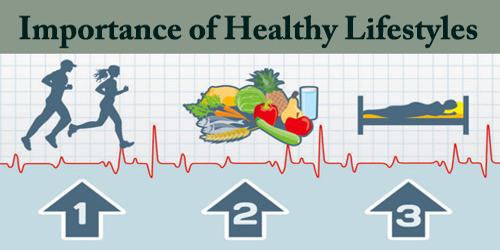A healthy lifestyle is important to take advantage of the birthright of good health with which we start life. If we were to become literate about how our bodies and minds work, we would be less likely to mistreat this amazing 24×7 immune system we walk around in. Our elders often stress upon the need for having a nutritious diet, sleeping and waking up on time each day, and going to nearby places by foot rather than using vehicles each time. However, most of us ignore their advice and continue with our unhealthy way of living. What they suggest is absolutely right. It is important to follow a healthy lifestyle. The need to switch to healthy habits is being stressed upon everywhere these days.
Here is why it is important to follow a healthy lifestyle:
- It makes us more organized and increases productivity.
- It makes us physically fit and keeps several health issues at bay.
- It is a great way to live stress-free.
- It renders a positive outlook.
- It brings us closer to our family and loved ones.
Indulging in unhealthy habits such as smoking, drinking, having junk food, spending too much time on screen can lead to various serious illnesses and should thus be avoided.
Nutritional habits have a huge impact on human health. Food should be balanced, saturate the body with proteins, fats, carbohydrates, be moderately caloric. It is better to cook food for a couple, in the oven, boil, stew, but acute, sour, fried foods should be avoided.
It’s extremely important for kids of this age to continue (or to start) to lead a healthy lifestyle, including eating nutritious meals as well as getting plenty of exercises and adequate sleep every day. These positive health habits will help children grow strong, stay healthy, and decrease the likelihood that they will become obese.
Childhood obesity rates have increased dramatically in recent years. According to the Centers for Disease Control, in 2004, 18.8% of school-aged children were obese (!), versus 4% of children 30 years before in 1974. Children’s skyrocketing rate of obesity is worrisome because it greatly increases children’s risk for remaining obese in adulthood, which in turn raises their risk for heart disease, stroke, cancer, diabetes, and premature death as adults. Obese children may also develop associated health problems during the middle childhood stage, such as high blood pressure, high cholesterol levels, and respiratory problems. Obesity can also set the stage for problems with self-esteem, depression, anxiety, and social ostracism, and/or being victimized by bullies.
Here are four pillars of good health that will lead to better health and greater longevity:
Exercise. Aerobic exercise should be a six-day-a-week experience of 30-45 minutes. Good health (and the resulting longevity) depend on good circulation because cells need oxygen to thrive. We oxygenate our blood with aerobic exercise and getting our heart rate up, ideally into an optimal exercise range calculated as 220 minus your age times .65 and .85. (Mine at 78 is 92–121).
The exercise regimen should include strength training at least two days a week. This is crucial and is generally overlooked and rejected as we get older. The primary contributor to early frailty and the frequency of falls amongst the elderly is the loss of muscle mass. Its call sarcopenia and it starts for all of us in our thirties and accelerates, especially in our fifties, unless addressed. The only antidote to the loss of muscle mass is strength-training and it should be a part of our exercise regimen throughout life.
Proper nutrition. We know the Standard American Diet (SAD) is killing us. With high sugar and fat content, our diets disrupt the natural process that our cells use to burn fuel efficiently and provide energy. Eventually, they become damaged. It’s the biological process behind diabetes which is now becoming pandemic in western cultures. An adjustment to a mostly plant-based diet has been proven to be a key to increased longevity.
Avoid social isolation. AARP once published a study revealing that the health risk of prolonged isolation is equivalent to smoking 15 cigarettes a day.
We are made to be social. But we tend to let that social engagement deteriorate especially if we choose to retire.
According to the new AARP Foundation website:
- 17 percent of American adults 65 and older are isolated
- Research shows a 26 percent increased risk of death due to the subjective feelings of loneliness
- 6 million adults 65 and older have a disability that prevents them from leaving their homes without the help
- 51 percent of people 75 and older live alone
As we age, we need to make a concerted effort to not only maintain but to increase our social connections.
Never stop learning. Henry Ford said: “Anyone who stops learning is old, whether twenty or eighty. Anyone who keeps learning today is young. The greatest thing in life is to keep your mind young. “
Charlie Munger, Warren Buffett’s partner and vice chairman of Berkshire Hathaway, says there is one quality of Buffett’s that he holds in especially high esteem: His ability to be a lifelong learner.
A healthy diet and adequate exercise are important in preventing Type II diabetes in childhood as well as obesity. Diabetes is a metabolic disease in which the body cannot properly metabolize (break down) the sugars from food. Because the body cannot metabolize sugars, the sugars accumulate in the bloodstream instead and ultimately stress children’s kidneys, heart, circulatory system, and eyes. Insulin, which is created in the pancreas, is the chemical that breaks down blood sugar. In Type II diabetes, the body does not produce enough insulin to deal with all the sugars coming into the body. This medical diagnosis used to be called “adult-onset diabetes” because the disorder primarily affected adults with poor eating and activity habits. Today, however, however, this illness is now diagnosed in America’s children far more than in adults. It is now referred to as “Type II diabetes”, to reflect this shift in prevalence.
Smoking, alcohol abuse, and, especially, drugs, have a very negative impact on the state of human health. Smoking is one of the main factors in the development of lung cancer, alcohol and drugs have a very bad effect on the condition and work of the internal organs, on the functioning of the nervous system, and gradually destroy the personality.
Too great enthusiasm for medicines is one of the main problems of modern mankind. This is especially true for antibiotics, which leads to the development of resistance (resistance) to bacteria, which can lead to ineffective treatment when this is actually needed. That is why it is so important not to engage in self-medication and not abuse drugs without special needs.
In addition, we must also have a regular life; self-cleaning; regular physical examination; pay attention to personal safety, prevent accidental injuries; correct bad behavior personality; sick to regular hospital diagnosis and treatment, to follow the doctor’s prescription for regular medication, pay attention to the treatment and nursed back to non-drug therapy Role; breaking superstition, believing in gods, and science; learning medical and health knowledge, learning self-health methods, and enhancing self-care ability.
World Health Day is held once a year, but it is always necessary to remember the importance of a healthy lifestyle. After all, adjusting our habits is not so difficult; we just need to realize how much benefit it will bring. And let the health services be available to everyone!
Information Sources:
















